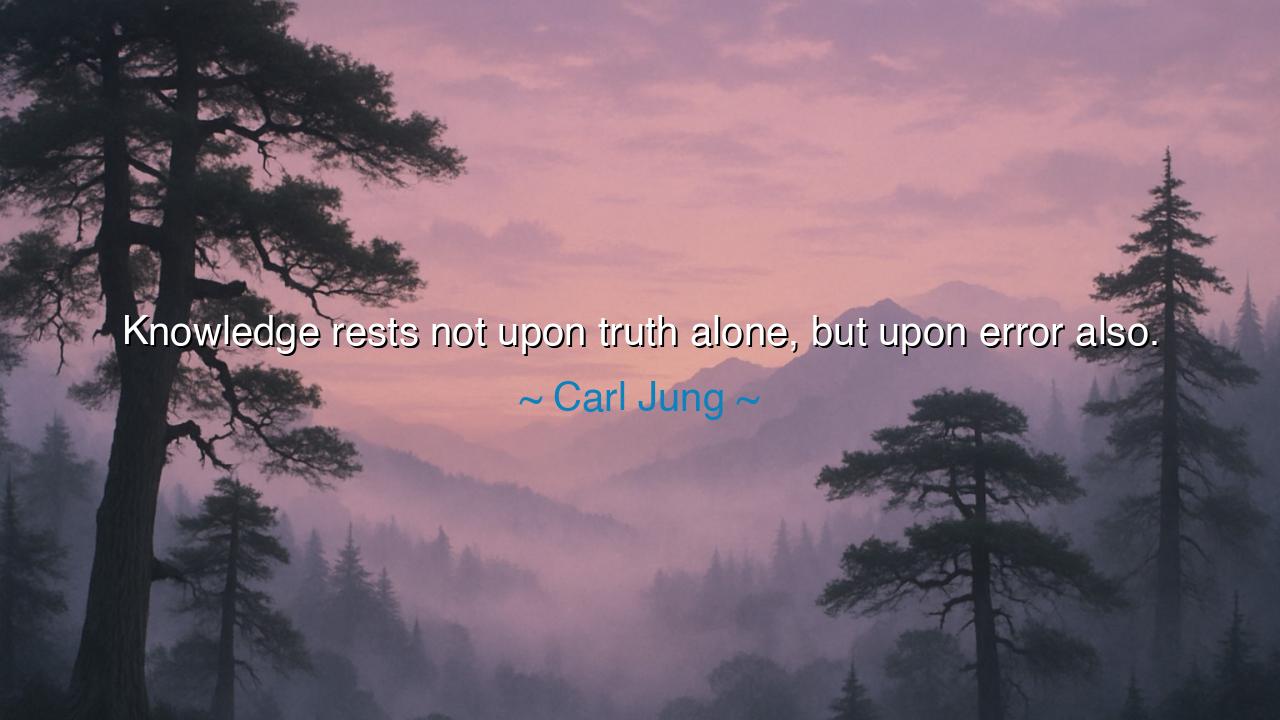
Knowledge rests not upon truth alone, but upon error also.






In the sacred pursuit of knowledge, where the light of wisdom illuminates the path of the seeker, there lies a truth spoken by the wise Carl Jung: “Knowledge rests not upon truth alone, but upon error also.” This declaration reveals the deep, mysterious dance between truth and error in the pursuit of wisdom. For the ancients understood that growth is not born solely from the clarity of truth but is also shaped, forged, and tempered through mistakes and missteps. In the journey toward understanding, error is as much a teacher as truth, for it is through the acknowledgement of our mistakes that we come closer to the essence of wisdom.
In the ancient traditions of the great philosophers, this truth was not foreign. Socrates, the father of Western philosophy, famously declared, “I know that I am intelligent because I know that I know nothing.” This paradoxical wisdom reveals the depth of Socrates' understanding: knowledge comes not from the accumulation of facts alone, but from the recognition of our ignorance and errors. To seek the truth, one must first be willing to admit that they do not know, to embrace the humility of error, and to learn from it. Socrates’ relentless questioning, his method of dialectic, was based on the understanding that through error, one refines their thoughts and moves closer to the truth.
The story of Thomas Edison, whose name is forever associated with invention, offers a modern reflection of Jung’s insight. Edison famously failed thousands of times before successfully inventing the light bulb. Each failure, each error, was a stepping stone toward success. Edison understood that knowledge was not found by avoiding failure but by embracing it, by learning from it, and by continuing to push forward with a heart full of determination. His numerous errors were not signs of defeat but essential parts of the process that eventually led to illumination. In this way, Edison’s life embodies the idea that error is not a hindrance to knowledge, but an integral part of the journey toward understanding.
The great scientists and thinkers of history, from Isaac Newton to Albert Einstein, similarly reveal that knowledge is often built on the foundation of error. Einstein’s theory of relativity, one of the most profound advancements in human understanding, did not come from the avoidance of error, but from a long process of testing, questioning, and refining theories that had been previously held as absolute. Newton’s laws of motion were built upon centuries of observations and mistakes, as he himself humbly admitted: “If I have seen further, it is by standing on the shoulders of giants.” Both men recognized that truth is not static and unchanging but evolves through a continuous dialogue between certainty and uncertainty, success and failure.
In these stories, we find the clear lesson that knowledge does not rest solely on truth but is woven from both truth and error. When we embrace our mistakes, when we reflect upon them with a heart open to learning, we unlock deeper layers of understanding. In this, we find a powerful form of growth, for it is the ability to learn from error that distinguishes the wise from the ignorant. Error is not to be feared or shunned, but respected as part of the learning process. Each mistake is an opportunity to refine our vision, to adjust our course, and to gain a deeper understanding of the world around us.
The wisdom of Jung invites us to see error as a necessary companion on the path of growth. The pursuit of knowledge is not a straight line but a winding journey where mistakes serve as guides, pointing us toward greater clarity. This approach encourages us to embrace failure, to understand it not as a barrier to success, but as an integral part of the journey toward deeper understanding. In doing so, we cultivate resilience and adaptability—key traits that empower us to continue the pursuit of wisdom even when the path is unclear.
Let us take action: In our own lives, let us not fear failure or error, but let us see them as the fertile soil from which true wisdom grows. Let us embrace the process of learning, knowing that with each mistake, we inch closer to truth. Reflect on our own errors with humility, not as failures, but as opportunities for growth. In our daily lives, whether in work, relationships, or self-improvement, let us remember that knowledge is not just the accumulation of what is right, but the continual unfolding of our understanding, shaped by both our successes and our mistakes. Through this, we will move ever closer to the deepest truths of life.






AAdministratorAdministrator
Welcome, honored guests. Please leave a comment, we will respond soon